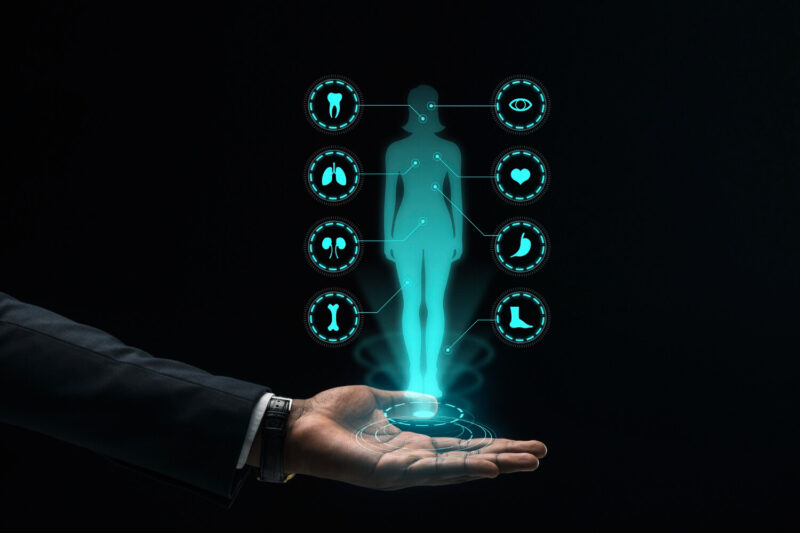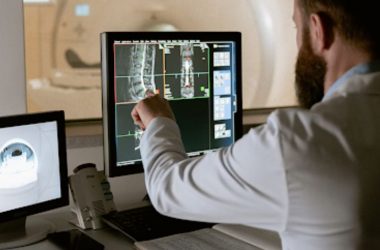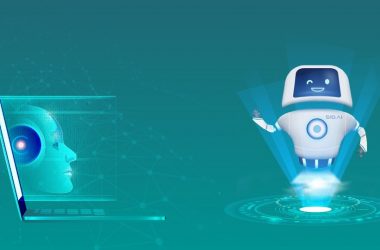In today’s world, where thousands of diseases have started to take over, AI technology is needed to help healthcare professionals handle various tasks and manage the sheer volume of patients. With numerous individuals requiring attention at any given time, AI technologies are required to provide each patient with specialized care.
AI healthcare solutions are superior to humans in critical tasks like disease diagnosis, where data analytics and algorithms surpass radiologists’ skills in identifying malignant tumors and offer researchers invaluable insights.
Moreover, integrating AI data analytics also helps to understand patients’ unique needs and provide customized treatment tailored specifically for them. It inspects each record in detail, like medical history, genetic makeup, and lifestyle factors, which empowers doctors to devise more effective and targeted treatment strategies.
In this blog, we will explore AI’s transformative power in healthcare, unveiling its ability to offer more precise and practical approaches that benefit patients and medical experts alike.
The Evolution of AI in Healthcare
As the rise of unknown diseases started to affect patients’ lives, the demand for AI technology became important. Doctors started to face complexity in predicting and diagnosing diseases. Hence, manual data entry and tracking of patient progress were also on the brink of obsolescence.
Therefore, the adoption of AI healthcare solutions just changes the way healthcare works, from automating records to managing bundles of data. This helps researchers identify potential new drugs and therapies, accelerating the development process.
Further, AI healthcare data analytics enables real-time tracking and monitoring of patient diseases, preventing epidemics before they worsen.
This highlights the importance of AI across various domains. AI efficiently analyzes data related to patient flow, appointment scheduling, and staffing levels. By doing so, AI assists healthcare facilities in better allocating resources, enhancing overall efficiency.
How Does the Implementation of Data Analytics Improve Patient Care?
As we all know, patients are the heart of healthcare. Therefore, the primary reason for integrating AI healthcare solutions is to enhance patient care. Data analytics has played a considerable role in this.
It allows doctors to inspect and survey large amounts of patient data accurately to make informed decisions about their health and collaborate more effectively with their healthcare providers.
In addition, AI in patient care empowers doctors to give attention to each patient’s needs by considering their unique medical history, genetic makeup, and lifestyle factors. This tailored strategy greatly enhances the likelihood of treatment success.
Hence, data analytics is changing healthcare by allowing a data-driven approach to patient care. This leads to various key improvements, benefiting both patients and healthcare providers. Here’s a breakdown of six ways data analytics is transforming patient care.
1. Precision Diagnoses
When AI technologies were not implemented in healthcare, traditional diagnosis methods relied on experience and intuition. But with AI and data analytics, it becomes easy to understand the vast amount of complex medical data, which includes patient records, test results, and historical trends. This allows for more precise diagnoses and improved treatment outcomes.
2. Personalized Care Strategies
Every patient requires care and needs differently. Therefore, data analytics works with real-time data from wearable devices to design unique treatment plans for machine learning and individual healthcare needs. This approach improves treatment effectiveness and patient satisfaction.
3. Predictive Healthcare
With AI-powered healthcare solutions, identifying high-risk patients has become more accessible. This enables doctors to intervene proactively and prevent critical health events. Consequently, there are fewer unplanned hospital admissions, better patient outcomes, and reduced healthcare costs.
4. Optimal Resource Allocation
Data analytics is even used to optimize resource allocation for hospitals and clinics. This helps to improve patient flow, appointment scheduling, staffing levels, and equipment usage. This leads to reduced wait times and better use of staff time and resources.
5. Proactive Patient Engagement
AI in healthcare solutions goes beyond just informing healthcare providers. It strengthens patient relationships and trust by using educational tools and reports generated through data analysis. That gives the patient a picture of their health status, potential risks, and treatment progress.
6. Data-Driven Patient Empowerment
It often happens that patients are not able to understand complex medical data. Therefore, data analytics is used to anticipate medical records and interpret them into human information. This approach promotes healthy relationships between patients and healthcare providers.
Top 6 Key Technologies Driving AI in Healthcare
While AI technologies have shown remarkable progress in handling and managing patients, it is far beyond that. AI healthcare technologies also support drug development, clinical trials, and research. Some of the most significant are.
1. Machine Learning (ML)
It is the foundation of many AI applications as ML algorithms are designed to train on various amounts of data to predict and find patterns. Similarly, machine learning in healthcare uses algorithms to learn from vast amounts of medical data (electronic health records, medical images, clinical trials) and improve their performance over time. Techniques like supervised and unsupervised learning are used for disease diagnosis or treatment recommendation tasks.
2. Predictive Analytics
It is one of the most important AI technologies for analyzing patients with cancer or brain tumors. Predictive analytics in healthcare use statistical methods to survey patient data. This typically allows health professionals to detect issues in advance so that doctors can give patients early intervention and recommendations.
3. Natural Language Processing (NLP)
NLP mimics humans. It allows machines to understand, interpret, and generate human language. It is used primarily in chatbots to interact with patients if they have questions and analyze clinical documents to extract relevant information.
4. Deep Learning
AI healthcare solutions use deep learning, a subfield of ML that interprets complex artificial neural networks. It excels at analyzing medical images (X-rays, MRIs) with high accuracy for disease detection, segmentation, and risk prediction. In drug discovery, deep learning is also used to understand molecular data and identify potential drug targets.
5. Computer Vision
It allows computers to interpret visual information. It plays a vital role in medical image analysis (similar to deep learning) and robotic surgery systems (enabling them to visualize the surgical field and perform precise movements).
6. Big Data Analytics
Healthcare generates massive amounts of data. Big data analytics tools are crucial for storing, processing, and analyzing this data to uncover hidden patterns and insights to improve patient care, resource allocation, and overall healthcare decision-making.
Real-World Applications of AI in Healthcare
We have discussed above how AI healthcare solutions transform the patient experience and improve outcomes. Let’s look at some real-world applications and what the future of AI in healthcare will look like.
1. AI for Faster and More Accurate Diagnoses
In older days, if you visit a doctor with a concerning cough. Traditionally, the doctor might rely on X-rays, blood tests, and experience to diagnose the cause—however, the integration of. AI will analyze your X-ray in a second and compare it to vast databases of chest X-rays with known diagnoses. By doing so, it will identify what disease a patient is having.
For Example
Zebra Medical VisioN, when implemented this approach it helps identify potential abnormalities for radiologists to review.
2. AI Chatbots for Improved Patient Support
Patients often struggle to understand complex medical diagnoses or appointment scheduling, which can be frustrating. AI chatbots can be a powerful resource. These virtual assistants can answer any questions about medications, symptoms, or procedures clearly and informally.
For Example
Babylon Health, a startup that uses AI chatbots to communicate with patients and provide medical advice, has gained popularity in the UK. The company’s chatbot can assess symptoms, recommend appropriate treatment, or refer the patient to a doctor if necessary.
3. AI-Assisted Surgery for Minimally Invasive Procedures
Now, AI even assists surgeons and guides their movements through robotic arms. This allows for high-precision maneuvers and minimizes invasive cuts, leading to faster recovery times and less pain for patients.
For Example
The Intuitive Surgical da Vinci system is a prominent example. It is used in various minimally invasive surgeries, such as hysterectomies and prostate cancer removal. With AI assistance, surgeons can perform these complex procedures with improved control and visualization.
The Future Outlook of AI in Healthcare
The future of AI in healthcare is vast and growing as it is already implemented in every aspect of healthcare, from diagnosis and treatment to patient engagement and resource allocation. As AI evolves, its influence on healthcare will only become more profound. Here’s a glimpse into the exciting possibilities that lie ahead.
1. Precision Diagnoses
AI will further refine its ability to analyze vast datasets of medical information, including genetic data, to identify individual risk factors and predict the best course of treatment for each patient. This personalized approach will move healthcare beyond a “one-size-fits-all” method, leading to more effective therapies and improved health outcomes.
2. Predictive Healthcare
The future of AI in healthcare systems will change how diseases are detected it will automatically predict potential health issues before they arise. And even suggest preventive measures like lifestyle changes to prevent serious illnesses altogether.
3. Improved Resource Allocation
The technology is not only used in healthcare; it also works in clinics. It helps staff and nurses give patients the resources they need most, reducing wait times and improving patient satisfaction.
Conclusion
AI is not here to take on the duties of a doctor and professional but to be a partner where that enhances workflow. The integration of this technology will further improve patient care quality and accessibility through predictive analytics and machine learning algorithms.
The future of AI in healthcare is poised to advance even further, particularly as personalized medicine gains traction. This shift promises more accurate, accessible, and efficient care for patients. Ultimately, it will enable healthcare providers to gain deeper insights into their patient’s needs and make more informed decisions. With AI’s support, the healthcare sector can continue evolving, striving to offer superior care to all.
Frequently Asked Questions (FAQs)
What Are the Main Benefits of Using AI in Healthcare Data Analytics?
The most prominent benefit is understanding and intercepting patients’ complex medical data so that doctors can understand what patients are suffering and suggest quick treatment.
How Does AI Improve Patient Care Specifically?
All patients in pain require staff and nurses to take care of them. However, managing each progress and record becomes difficult when there are thousands of these patients. With AI, nurses can track each patient and give them customized treatment.
What Are the Challenges Faced by Implementing AI Technologies in Healthcare?
The biggest challenges are protecting patients’ sensitive data and ensuring that algorithms are free from bias. Despite these hurdles, AI healthcare solutions have proven to be the best. Healthcare also ensures cybersecurity measures are taken before storing patients’ records.
Can AI in Healthcare Lead to Better Patient Outcomes? How?
Yes, AI will lead to better patient outcomes. With machine learning and data analytics, patients will get early diagnosis and treatment, which will contribute to saving billions of lives.
What Is the Future Outlook for AI in Healthcare, and What Advancements Can We Expect?
The future of AI in healthcare is promising. It will improve virtual assistants, robotic surgery, and drug discovery, which will enhance overall health efficiency.

Dawood is a digital marketing pro and AI/ML enthusiast. His blogs on Folio3 AI are a blend of marketing and tech brilliance. Dawood’s knack for making AI engaging for users sets his content apart, offering a unique and insightful take on the dynamic intersection of marketing and cutting-edge technology.










